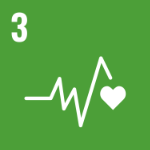

3. Good health and well-being

17. Partnerships for the goals
Effects of change in hospital treatment payment policy for Palestinian refugees in Lebanon: a health economics analysis
BACKGROUND
In 2016, the United Nations Relief and Works Agency for Palestine Refugees in the Near East (UNRWA) changed from covering the full cost of secondary care in contracted public and private hospitals in Lebanon, Jordan, to requesting that these hospitals pay 10% of the costs. Meanwhile, services at UNWRA-contracted Palestine Red Crescent Society (PRCS) hospitals remained fully covered. We did a health economics analysis to assess the effects this policy change on the demand for secondary care in UNRWA hospitals.
METHODS
We assessed the difference in use of different types of hospital (demand) from January to May, 2016, and June, 2016, to October, 2017, before and after the payment policy change. Data were collected by UNWRA from each hospital's database, including individual-level inpatient information for 22 193 Palestinian refugees in Lebanon who were admitted to secondary care at UNRWA-contracted hospitals (public, private, and PRCS). We used regression analyses to estimate the effects on demand for the different hospital types, length of stay, and total costs of treatment to UNWRA and patients.
FINDINGS
Around 64% of patients attended PRCS, 26% private, and 9% public hospitals. According to our econometric estimations, after June, 2016, patients were 16% more likely to choose a PRCS hospital over the other types of hospital. Mean length of stay in PRCS hospitals increased, leading to a 20% chance of patients staying 1 day longer in PRCS hospitals than in public or private hospitals. However, the length of stay in public and private hospitals decreased (by an average of 22% at public and 28% at private hospitals), giving an overall decrease in length of stay of 13%. In terms of bill value (ie, total costs to UNRWA and to patients), we found no difference between before and after the policy change.
INTERPRETATION
The introduction of the UNWRA cost-sharing component for secondary care led patients to attend PRCS hospitals more often and for longer periods of time. The finding that no effect was seen on costs for UNRWA or patients suggests that the 10% cut in cover at public and private hospitals did not save any money for UNWRA because patients managed to accommodate the increase by changing their hospital preference The study is limited in that it cannot argue causality between the policy and the results found because there is no control group. Nevertheless, robustness testing, including assessing the year 2017, supports our results. This study contributes to the literature on the impacts of co-payments in health care in a very specific context of poverty and conflict that has rarely been subject to scrutiny and provides feedback to UNRWA on a health-care system measure, relevant for future policy designs.
The research paper can be found here
This MSc thesis was supervised by Professor Pedro Pita Barros, Founder of Nova SBE Health Economics & Management Knowledge Center.

